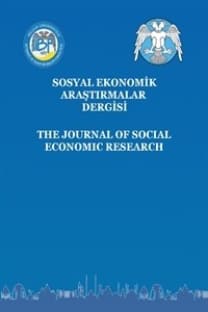Bu çalışmada, Türkiye ekonomisi için M2 geniş kapsamlı parasal büyüklüğü üzerine kurulan bir para talebi modeli elde para tutumuna karşı çeşitli almaşık maliyet unsurları dikkate alınarak portföy temelli bir yaklaşım içerisinde incelenmektedir. Aynı dereceden bütünleşik değişkenlerin çok değişkenli eş-bütünleşim tahmin yöntemi kullanılarak incelenmesi şeklinde elde ettiğimiz tahmin sonuçları uzun dönem para talebi değişken uzayı içerisinde kuramsal beklentilerle uyumlu eş-bütünleşik bir vektörün bulunduğunu göstermiştir. Para talebine karşı başlıca almaşık maliyet unsurları ekonomi içerisinde yerleşik para ikamesi olgusunun önemini ortaya koyan yerli paranın değer kayıpları ve hisse senedi fiyatlarındaki gelişmeler şeklinde bulunmuştur. Ayrıca, bulgularımız yurtiçi enflasyonun zayıf dışsal bir özellik taşıdığını göstermiş ve yurtiçi enflasyona yol açan temel etkenlerin para talebi değişken uzayı dışında belirlendiği sonucuna ulaşılmıştır.
Anahtar Kelimeler:
Geniş Para Talebi, Eş-bütünleşim, Para İkamesi, Türkiye Ekonomisi
MODELING TURKISH M2 BROAD MONEY DEMAND: A PORTFOLIO-BASED APPROACH USING IMPLICATIONS FOR MONETARY POLICY
In this paper, a money demand model upon M2 broad monetary aggregate for the Turkish economy is examined in a portfolio-based approach considering various alternative cost measures to hold money. Employing multivariate co-integration methodology of same order integrated variables, our estimation results indicate that there exists a theoretically plausible co-integrating vector in the long-run money demand variable space. The main alternative costs to demand for money are found as the depreciation rate of domestic currency and the course of equity prices, for which the former brings out the importance of currency substitution phenomenon settled in the economy. Besides, we find that domestic inflation carries a weakly exogenous characteristic and conclude that the main factors leading to the domestic inflation are determined out of the money demand variable space.
Keywords:
Broad Money Demand, Co-integration, Currency Substitution, Turkish Economy,
- ISSN: 2148-3043
- Yayın Aralığı: Yılda 2 Sayı
- Başlangıç: 2000
- Yayıncı: Selçuk Üniversitesi
Sayıdaki Diğer Makaleler
MAX WEBER’E GÖRE İKTİSADİ ZİHNİYETİN RASYONALİZASYONU
KAMU YÖNETİMİNİN DÖNÜŞÜMÜ VE DÖNÜŞÜMÜN TEMEL UNSURLARI
ÖRGÜTLERDE GÜNCEL BİR SORUN: “MOBBING”
Hande MİMAROĞLU, Hüseyin ÖZGEN
ÖZELLEŞTİRME VE SOSYAL DESTEK PROJELERİNİN ÖNEMİ: BİR UYGULAMA
ÜRETİMDE KALİTE ODAKLI SÜREÇ GELİŞTİRME ANALİZİ: PANEL PRES KAPI ÜRETİM ÖRNEĞİ
TÜKETİCİLERİN FİYAT ALGILAMALARINA YÖNELİK BİR ARAŞTIRMA
TEKNOLOJİ POLİTİKALARI VE TÜRKİYE: BİR İNCELEME
KAMUOYU KURAMLARI VE KAMUOYU OLUŞUMUNDA KİTLE İLETİŞİM ARAÇLARI
